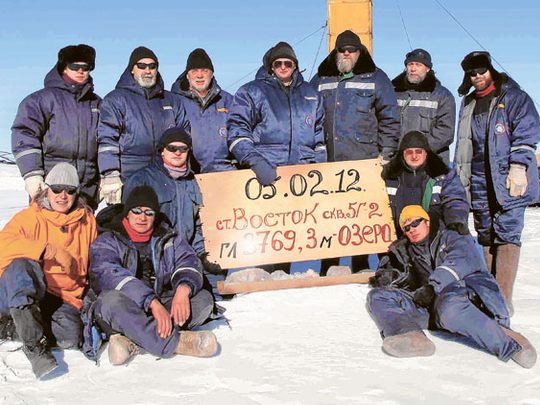
Moscow: Opening a scientific frontier kilometres under the Antarctic ice, Russian experts drilled down and finally reached the surface of a gigantic freshwater lake, an achievement the mission chief likened to placing a man on the moon.
Lake Vostok could hold living organisms that have been locked in icy darkness for some 20 million years, as well as clues to the search for life elsewhere in the solar system.
Touching the surface of the lake, the largest of nearly 400 subglacial lakes in Antarctica, came after more than two decades of drilling, and was a major achievement avidly anticipated by scientists around the world.
"In the simplest sense, it can transform the way we think about life," Nasa's chief scientist Waleed Abdalati told The Associated Press in an email on Wednesday.
The Russian team made contact with the lake water on Sunday at a depth of 3,769 metres, about 1,300 kilometres east of the South Pole in the central part of the continent.
Scientists hope the lake might allow a glimpse into microbial life forms that existed before the Ice Age and are not visible to the naked eye.
Microbial life
Scientists believe that microbial life may exist in the dark depths of the lake despite its high pressure and constant cold conditions similar to those believed to be found under the ice crust on Mars, Jupiter's moon Europa and Saturn's moon Enceladus.
Valery Lukin, the head of Russia's Arctic and Antarctic Research Institute, said reaching the lake was akin to the Americans winning the space race in 1969.
"I think it's fair to compare this project to flying to the moon," said Lukin, who oversaw the mission and announced its success.
American and British teams are drilling to reach their own subglacial Antarctic lakes, but Columbia University glaciologist Robin Bell said those are smaller and younger than Vostok, which is the big scientific prize.
"It's like exploring another planet, except this one is ours," she said.
At 250 kilometres long and 50 kilometres wide, Lake Vostok is similar in size to Lake Ontario.
Lukin said he expects the lake to contain chemotroph bacteria that feed on chemical reactions in pitch darkness, probably similar to those existing deep on the ocean floor but dating back millions of years. "They followed different laws of evolution that are yet unknown to us," he said.












